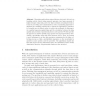Free Online Productivity Tools
i2Speak
i2Symbol
i2OCR
iTex2Img
iWeb2Print
iWeb2Shot
i2Type
iPdf2Split
iPdf2Merge
i2Bopomofo
i2Arabic
i2Style
i2Image
i2PDF
iLatex2Rtf
Sci2ools
127
click to vote
DEXA
2003
Springer
2003
Springer
Capturing Uncertainty in Spatial Queries over Imprecise Data
Emerging applications using miniature electronic devices (e.g., tracking mobile objects using sensors) generate very large amounts of highly dynamic data that poses very high overhead on databases both in terms of processing and communication costs. A promising approach to alleviate the resulting problems is to exploit the application’s tolerance to bounded error in data in order to reduce the overheads. In this paper, we consider imprecise spatial data and the correlation between the data quality and precision requirements given in user queries. We first provide an approach to answer spatial range queries over imprecise data by associating a probability value with each returned object. Then, we present a novel technique to set the data precision constraints for the data collecting process, so that a probabilistic guarantee on the uncertainty in answers to user queries could be provided. The algorithms exploit the fact that objects in two-dimensional space are distributed under cert...
Related Content
| Added | 06 Jul 2010 |
| Updated | 06 Jul 2010 |
| Type | Conference |
| Year | 2003 |
| Where | DEXA |
| Authors | Xingbo Yu, Sharad Mehrotra |
Comments (0)

